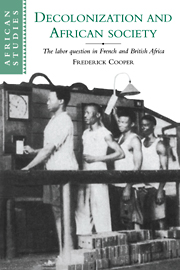Book contents
- Frontmatter
- Contents
- List of tables and figure
- Preface
- List of abbreviations
- Map of French and British colonial Africa
- 1 Introduction
- Part I The dangers of expansion and the dilemmas of reform
- Introduction
- 2 The labor question unposed
- 3 Reforming imperialism, 1935–1940
- 4 Forced labor, strike movements, and the idea of development, 1940–1945
- Conclusion: posing the labor question
- Part II Imperial fantasies and colonial crises
- Part III The imagining of a working class
- Part IV Devolving power and abdicating responsibility
- Conclusion
- Notes
- Bibliography
- Index
- OTHER BOOKS IN THE SERIES
Introduction
Published online by Cambridge University Press: 22 February 2010
- Frontmatter
- Contents
- List of tables and figure
- Preface
- List of abbreviations
- Map of French and British colonial Africa
- 1 Introduction
- Part I The dangers of expansion and the dilemmas of reform
- Introduction
- 2 The labor question unposed
- 3 Reforming imperialism, 1935–1940
- 4 Forced labor, strike movements, and the idea of development, 1940–1945
- Conclusion: posing the labor question
- Part II Imperial fantasies and colonial crises
- Part III The imagining of a working class
- Part IV Devolving power and abdicating responsibility
- Conclusion
- Notes
- Bibliography
- Index
- OTHER BOOKS IN THE SERIES
Summary
Before the mid-1930s, British and French officials were unable to sustain a straightforward discussion of the labor question, even in the secrecy of government correspondence. The quest of European governments to define a progressive mission for themselves in the colonizing of distant peoples and the long history of anti-slavery movements led – through international conferences and humanitarian agitation – to a focus on free labor as the basic test of the responsible colonizer. But the dichotomy of free and coerced labor offered little guidance to the daily practice of colonial administration and left in the shade an enormous and ambiguous terrain where colonial governments exercised power over how Africans worked.
The questions colonial officials had most difficulty posing in the 1920s and early 1930s concerned work as a social process: the relationship of how people worked to the way they lived, to the expectations they brought to the workplace, to the ways in which they experienced the power of employers and colonial officials, to the relationships they formed and the aspirations they acquired through employment and urban life, and to the ways they reproduced themselves. By this time, colonial thinking was so deeply caught in the conception of the African as immersed in “tribal” culture and obedient to “chiefly” authority that they could only conceive of a wage worker outside a village framework as “detribalized.”
- Type
- Chapter
- Information
- Decolonization and African SocietyThe Labor Question in French and British Africa, pp. 23 - 24Publisher: Cambridge University PressPrint publication year: 1996
- 1
- Cited by



